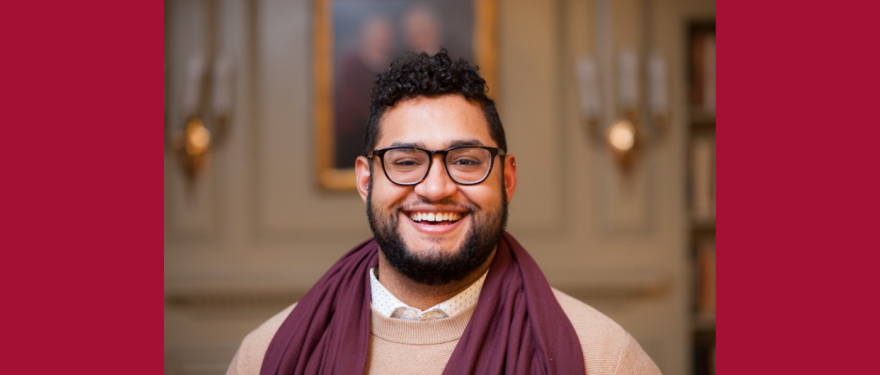Brian Ventura (MBA 2022) is one of two DEI officers for PRIDE, the LGBTQ+ club at HBS. Originally from Orlando, Florida, Brian identifies as a queer Afro-Latino and came to Boston ten years ago as a first-generation college student at Harvard College. He worked in fields ranging from financial services to catering to product management before returning to Harvard for his MBA. Here, Brian shares a reflection of his first time coming out in the workplace in honor of National Coming Out Day.
It’s July 2016. It’s the first day of my first job post-undergrad and I, along with some 30 other new associates at this financial services firm, am in training. We’ve received an itinerary for the day: it’s icebreakers, a whole lot of Excel modeling, some training on basic asset classes—nothing too difficult, though perhaps a little mind-numbing.
At least until the first icebreaker question comes out of our trainer’s mouth.
“Who is your celebrity crush?”
It’s a simple question, kind of stupid actually (what are my new colleagues really going to learn about each other from their celebrity crushes?) but it kicks off a familiar process in my brain. A process I’ve come to call the “coming out calculus.”
By the time I start this job, I’ve been out of the closet for multiple years. I told a friend in the 8th grade I liked boys and have had all the typical “coming out” moments since—coming out to my parents, etc.—but each of these moments involved a deep reflection, a cost-benefit analysis if you will (this is HBS, after all).
This “coming out calculus” involves analyzing the specific situation at hand and determining if it’s appropriate to disclose my queer identity:
First and foremost—is it safe? Am I going to be attacked, physically or verbally, due to being gay? The answer isn’t always obvious. I’ve stopped holding a partner’s hand in public at night because I see those around looking a little too closely and looks can easily turn to violence.
If it appears safe, the second question is—do I want to deal with the microaggressions that will follow? Microaggressions are something I already deal with by virtue of being a large, Afro-Latinx person (“Do you speak English?” is a question I am all too familiar with). Adding “gay” to my known intersectional identities usually brings on two flavors of interactions: the “Which one of you is the girl?”-style ignorant questions and the “Be my gay best friend!”-objectifying statements. Both are annoying.
Next—is there a limit to how gay I can be? In many situations, there is a Threshold of Tolerable Gay. For example: in the workplace, a gay man who acts like “one of the guys” is tolerated while a gay man who swishes his hips is ostracized, usually due to latent sexism. Opening up the gay Pandora’s box means priming those around you to look for these “gay” cues and, sometimes, use them as reasons for exclusion.
Finally—what is the alternative? If I can’t or won’t come out in this situation, what happens? Do I have to use gender neutral pronouns to describe my partner? How much energy do I need to expend to “not seem gay?” If safety is an issue, the alternative is the only option. If safety is relatively assured, then it’s imperative to weigh the other factors in relation to the mental toll of hiding myself, of covering who I really am, until I feel ready to share that part of myself—if I ever feel ready.
While my brain runs through the now familiar operations of the coming out calculus, my new colleagues are shouting out their celebrity crushes with ease. As my turn approaches, I realize how exhausted I am to always have to do this, how familiar the anxiety is, how it feels like so much of this new world I’m entering in hinges on the answer to a stupid icebreaker question.
This existential crisis consumes the last bit of time I had to think, and now it’s my turn. Some 30 sets of eyes are staring at me, waiting. I do the last bit of coming out calculus and come to a decision. My mouth opens.
“If I had to pick one, my celebrity crush is definitely—"

